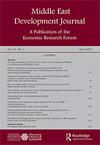Institutions and macroeconomic policies in resource-rich Arab economies
IF 0.9
Q4 DEVELOPMENT STUDIES
引用次数: 6
Abstract
This volume contributes to the literature on the Arab World in two main ways. First, the regional focus on the role of institutions and macroeconomic policies fills an enormous research gap as this has been largely understudied, mainly due to the insufficiency of informational disclosure by governments in general and especially fiscal institutions. Hence, an important contribution of this volume is to reveal more detailed information concerning problems and policies of the region’s oil exporters. Second, given the constraints hindering macroeconomic reforms in Arab oil-exporting countries, it offers a novel political economy analysis that examines the ways in which resource endowments affect political regimes and the choice of macroeconomic institutions and policies in oil-rich Arab economies. The four main questions addressed in this volume are: (i) Do institutions (both political and economic) matter for macroeconomic policies in Arab oil exporters, and if so how? (ii) What are the main features of the macroeconomic institutions (fiscal, monetary, and exchange rate regimes) that are most effective in mitigating commodity price volatility, growth volatility, inefficiency in expenditure allocations, and corruption? (iii) How well are existing fiscal institutions performing in terms of fiscal policies and outcomes? (iv) When fiscal institutions are not performing well, what should be done about this?资源丰富的阿拉伯经济体的体制和宏观经济政策
这一卷有助于文学对阿拉伯世界在两个主要方面。首先,对制度和宏观经济政策作用的区域性关注填补了一个巨大的研究空白,因为这方面的研究在很大程度上是不足的,主要是由于一般政府,特别是财政机构的信息披露不足。因此,本卷的一个重要贡献是揭示有关该地区石油出口国的问题和政策的更详细信息。其次,考虑到阻碍阿拉伯石油出口国宏观经济改革的制约因素,它提供了一种新的政治经济学分析,检查资源禀赋影响政治制度的方式以及石油丰富的阿拉伯经济体中宏观经济制度和政策的选择。本卷讨论的四个主要问题是:(i)体制(政治和经济)对阿拉伯石油出口国的宏观经济政策有影响吗?如果有影响,如何影响?(二)在减轻商品价格波动、增长波动、支出分配效率低下和腐败方面最有效的宏观经济制度(财政、货币和汇率制度)的主要特点是什么?(三)现有财政机构在财政政策和财政成果方面的表现如何?(四)当财政机构表现不佳时,应如何应对?
本文章由计算机程序翻译,如有差异,请以英文原文为准。
求助全文
约1分钟内获得全文
求助全文

 求助内容:
求助内容: 应助结果提醒方式:
应助结果提醒方式:


